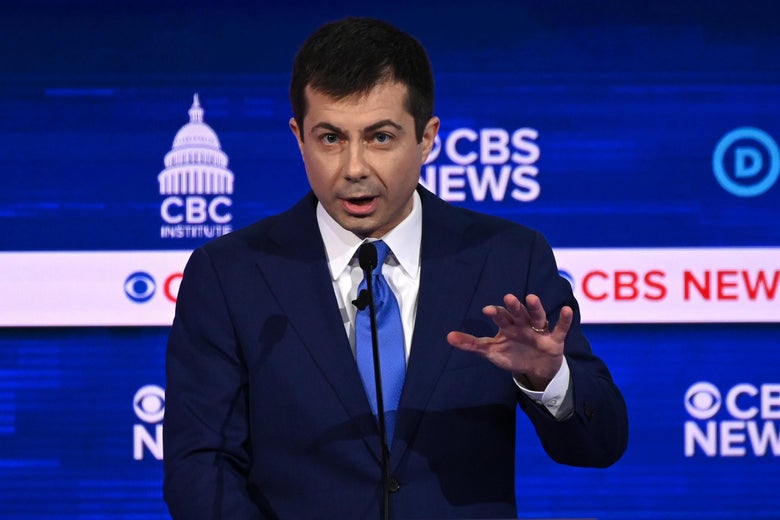
Pete Buttigieg participates in the tenth Democratic primary debate of the 2020 presidential campaign season at the Gaillard Center in Charleston, South Carolina, on February 25, 2020.
JIM WATSON/Getty Images
Over the past few months, political commentators have struggled to explain why many LGBTQ people, especially younger cohorts, have not enthusiastically lined up behind Pete Buttigieg’s historic campaign to be the first openly gay nominee for president. (Surveys of the group have shown him trailing Sanders and Warren.) Most recently, the New Yorker’s Masha Gessen offered an explanation for this apparent surprise, generalizing a broad divide in the community between queers who believe their queerness has a clear political component—one that happens to align more with party’s left wing vision of radical societal change—and those who view it merely as a demographic, “small part of me” detail that need not speak to anything other than basic gender identity or sexual orientation. Buttigieg has shown himself consistently to be the avatar of the latter camp, and in Tuesday night’s debate in Charleston, South Carolina, he made a strikingly transparent statement that should clarify the issue for anyone still confused.
Sticking to his recent mission of rescuing the Democratic party from its progressive flirtations in the face of the Trump juggernaut, Buttigieg said: “I am not looking forward to a scenario where it comes down to Donald Trump with his nostalgia for the social order of the 1950s and Bernie Sanders with the nostalgia for the revolutionary politics of the 1960s.” His campaign quickly captured the moment in a tweet, slightly revising to argue that the result was a scenario “we can’t afford.” Buttigieg was specifically referencing recent attacks on Sanders’ history of making statements that were less than categorically hostile to leftist authoritarian governments like that of Cuba, but in trying to bring back the language of the Cold War, he landed on a much more sweeping rejection of the 1960s.
Archive.org
The 1960s were, of course, a period when numerous political revolutions flowered in the United States, particularly those related to feminism and racial justice. Drawing lessons from these and others, the gay rights movement, after a period of relative smoldering, sparked off with a bang at the Stonewall Riots of 1969 and marched into a decade of radical political imagination and challenges to the prevailing heteropatriarchy. That flash of possibility only dimmed with the profound loss of life and new, narrower advocacy demands of the AIDS crisis in the 1980s and ‘90s.
The details of this history are too rich to cover in a post-debate blog post. But what’s easy enough to say is that in dismissing the “revolutionary politics of the 1960s” as “nostalgia” that he’d rather avoid, Pete Buttigieg as made abundantly clear why queer people of Gessen’s first, politicized category may not see him as a peer. To dismiss the political fervor and creativity of the ‘60s is to dismiss the exact historical moment that made his candidacy, his marriage, his very public existence, possible. It is to abjure all the work, ingenuity, and sacrifice that his ancestors (though he may not recognize them as such) invested to enable such a strange, calculated relationship to his own gayness. To feel unable to “afford” the ‘60s is to suggest that the righteous emotions and ideas that fomented Stonewall, the sort of wild dreams and unruly energies that introduced the possibility of queer liberation to the world, are just too costly for us in 2020.
If Mayor Pete really thinks that, then he and his campaign should have no trouble understanding why many of us queers don’t see him or his presidential bid as something to be terribly proud of. But hey, maybe there is a trace of shame yet in South Bend. After initially tweeting the disavowal of the decade that brought us Stonewall as a highlight of his debate performance, the candidate to be America’s first out gay president quickly deleted it.
Readers like you make our work possible. Help us continue to provide the reporting, commentary and criticism you won’t find anywhere else.
Join Slate Plusfrom Slate Magazine https://ift.tt/2T1tqAo
via IFTTT
沒有留言:
張貼留言